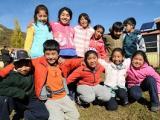- عربي
- 中文
- English
- Français
- Русский
- Español
Senate of Chile approves the Third Optional Protocol to the Convention on the Rights of the Child and joins global efforts to strengthening international and national child protection systems on children's rights

New York, 2 April 2015 - The National Institute of Human Rights of Chile, the Special Representative of the UN Secretary-General on Violence against Children, the Regional Office for South America of the United Nations Office of the High Commissioner for Human Rights and UNICEF welcome the decision by the Senate of Chile to unanimously approve the Third Optional Protocol to the Convention on the Rights of the Child, which will soon enter into force.
The Third Protocol establishes a mechanism of individual complaints and therefore represents a milestone in the compliance of international law on the rights of children and adolescents. Thanks to it, children and adolescents are now able to submit complaints before the United Nations Committee on the Rights of the Child for the violation of any of the rights included in the United Nations Convention on the Rights of the Child and in the Optional Protocols on the involvement of children in armed conflict and on the sale of children, child prostitution and child pornography.
This complaint mechanism does not replace the internal mechanisms and procedures of individual States. It only applies when the State has ratified the Protocol, when all the possible domestic judicial remedies have been exhausted or when such remedies have proven to be ineffective or too lengthy.
Complaints also need to respect other admissibility criteria. For instance, the complaint should have not been examined under another international procedures or investigation, should be based on facts, signed, and submitted in writing within a deadline.
Ms. Lorena Fries, Director of the National Institute on Human Rights (INDH) acknowledged this achievement as a step forward in the protection of children and emphasised that “As INDH, we deeply value the entry into force of this mechanism. Boys and girls in Chile whose rights have been violated can now rely on a new mechanism in the United Nations, and also appeal to it, standing up for their rights. It is important that children and civil society as a whole get to know the new tool that this treaty represents for children's protection and safety”.
Welcoming the recent vote by the Senate of Chile, the Special Representative of the UN Secretary-General on Violence against Children, Ms. Marta Santos Pais, highlighted that “the ratification by Chile of the Third Protocol will constitute a significant achievement towards the strengthening of the protection system of the rights of girls, boys and adolescents, guaranteeing the establishment of mechanisms of prevention and protection of children from all forms of violence”.
The Office of the United Nations High Commissioner for Human Rights will take the role of technical secretariat for the functioning of the Protocol. This implies the obligation of receiving the complaints, processing them and providing information on the content, proceedings and alternatives offered by this treaty.
“We congratulate Chile for this important step in the ratification of an international commitment”, said Mr. Amerigo Incalcaterra, the Regional Representative for South America of the OHCHR. “The ratification represents an important progress towards the full implementation of the rights of children and adolescents in the country, granting children access to an international human rights body, a possibility that adults already have under several international treaties”, Mr Incalcaterra emphasised.
“Allowing children to bring a complaint for the violation of their rights to an international body, reinforces the fact that they are rights holders and the capacity to request compliance with the rule of law”, said Ms. Hai Kyung Jun, Representative of UNICEF for Chile. “Without any doubt, this is a step forward in the compliance with children's rights standards, very much in line with the State of Chile’s effort to ensure more and better guarantees for the rights of all the children living in this country”, she added.
The 16 countries that have already ratified the Third Optional Protocol since its creation in 2011 until today are: Albania, Andorra, Belgium, Bolivia, Costa Rica, El Salvador, Gabon, Germany, Ireland, Monaco, Montenegro, Portugal, Slovakia, Spain, Thailand and Uruguay.

